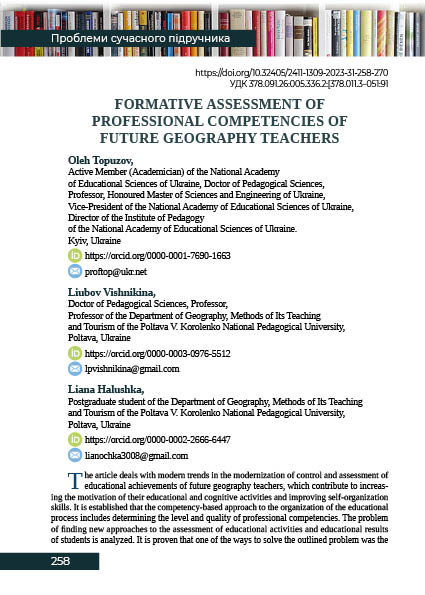Формувальне оцінювання професійних компетентностей майбутніх учителів географії

Опубліковано 17.01.2024
Ключові слова
- формувальне оцінювання,
- компетентнісний контроль,
- технологія,
- мотивація навчально-пізнавальної діяльності студентів,
- компетентнісно орієнтовані завдання
- майбутні вчителі географії ...Більше
Як цитувати

Ця робота ліцензується відповідно до Creative Commons Attribution-NonCommercial-ShareAlike 4.0 International License.
Анотація
У статті розглянуто сучасні напрями модернізації контролю та оцінювання навчальних досягнень майбутніх учителів географії, які сприяють підвищенню мотивації їхньої навчально-пізнавальної діяльності і покращенню навичок самоорганізації. Встановлено, що компетентнісний підхід до організації навчального процесу включає визначення рівня і якості професійних компетентностей. Проаналізовано проблему пошуку нових підходів до оцінювання навчальної діяльності і навчальних результатів студентів. Доведено, що одним із шляхів вирішення окресленої проблеми є системне впровадження формувального оцінювання навчальних досягнень як компоненту технології компетентнісного контролю. Розтлумачено поняття «формувальне оцінювання», «компетентнісний контроль», «компетентнісно орієнтовані завдання» та окреслено їхнє місце у навчальному процесі. Представлено модель процесу здійснення формувального оцінювання у закладах вищої освіти, алгоритм застосування компетентнісно орієнтованих завдань, структурні компоненти технології компетентнісного контролю і формувального оцінювання. У роботі виокремлено і схарактеризовано діагностувальний, поточно-формувальний, самооцінювально-формувальний, модульно-формувальний, підсумково-нормативний та кваліфікаційний види оцінювання навчальних досягнень студентів. На основі досвіду впровадження технології компетентнісного контролю і формувального оцінювання доведено, що вона сприяє підвищенню мотивації та самоорганізації студентів, дозволяє викладачеві діагностувати і вносити позитивні зміни у навчальний процес, підтримувати зворотній зв’язок зі студентами. Порівняння традиційного оцінювання та технології компетентнісного контролю і формувального оцінювання продемонструвало її спроможність щодо комплексного оцінювання і визначення рівня сформованості компетентностей майбутніх учителів географії. Зроблено висновок, що впровадження цієї технології, з одного боку, надає можливість викладачам забезпечити ефективну навчальну діяльність студентів на високому рівні вмотивованості, самоорганізації та відповідно до їхніх інтересів. З іншого, сприятиме професійному розвитку майбутніх вчителів географії, які навчатимуть учнів в умовах реформування вітчизняної освіти.
Завантаження
Посилання
- Vember V.P. Implementation of BYOD technology for formative assessment. Innovative technologies in education: collection of materials of the international scientific and technical conference, Ivano-Frankivsk, April 9-11, 2019. P. 45-47. URL: https://elibrary.kubg.edu.ua/id/eprint/27271/1/V_Vember_ITO_2019_FITU.pdf
- Law of Ukraine On Higher Education No. 37-38 dated 27.10.2022. Verkhovna Rada of Ukraine. Legislation of Ukraine. URL: https://zakon.rada.gov.ua/laws/show/1556-18#Text
- Ilchenko A.M., Sheiko S.V. Higher education and the Bologna process: Teaching and methodological manual. Poltava: RVV PDAA, 2014. 316 p.
- Teaching manual for the discipline Pedagogy of Higher Education" / Compiled by A.V. Lysenko. Poltava: PoltNTU, 2018. 102 p.
- Turkot T.I., Konoval O.A. Pedagogy and psychology of higher school: Teaching manual for students of higher educational institutions. Kherson: Oldi-plus, 2013. 466 p.
- Kalashnikova L.M., Zhernovnikova O.A. Higher school pedagogy in diagrams and tables: teaching manual. Kharkiv, 2016. 260 p.
- Strazhnikova I. (2018). Higher school pedagogy: teaching and methodological manual. Ivano-Frankivsk: NAIR, 2018. 120 p.
- Shidlovska V., Mironchuk N.M. Control of the educational and cognitive activity of students and the forms of its implementation. Modernization of higher education in Ukraine and abroad: collection of scientific papers / under the general editorship of doctor of pedagogical sciences, professor S.S. Vitvitska, candidate of pedagogical sciences, associate professor N.M. Mironchuk. Zhitomir: publishing house of ZhSU named after I. Franko, 2014. P. 165-168.
- Nemchenko S.H., Holik O.B., Lebid O.V. Higher school pedagogy: Manual for students of higher educational institutions. Donetsk: LANDON-ХХІ, 2014. 534 p.
- Gusen Torsten, Tijnman Albert. Monitoring of education standards: why and how it all began. Monitoring of education standards / under editorship of Albert Tijnman and T. Nevil Poslweit. Lviv: Litopys, 2003. P. 15-41.
- Kellaghan T., Greaney V. Using Assessment to Improve the Quality of Education. Paris : UNESCO-International Institute for Education Planning, 2001. 98 p.
- Lokshyna O. I. (2009) Innovations in the evaluation of educational achievements of students in school education in the countries of the European Union Comparative pedagogical studies (2). p. 107-114. URL: https://lib.iitta.gov.ua/7084/
- Kalinina I.M. Formative assessment of educational achievements of higher education students. Graal Nauki, 2021, 5. p. 285–290. URL: https://ojs.ukrlogos.in.ua/index.php/grail-of-science/article/view/13126/12063
- Formative Assessment: Improving Learning in Secondary Classrooms, 2005. URL: https://www.oecd.org/education/ceri/35661078.pdf
- Pidhorna O., Berehovska T. What is formative assessment, why do students need it, and what are its main challenges. New Ukrainian School. URL: https://nus.org.ua/view/shho-take-formuvalne-otsinyuvannya-chomu-vono-potribne-uchnyam-i-yaki-osnovni-vyklyky/
- Predyk A. Formative assessment as a key factor in quality education at NUS. Materials of the 6th All-Ukrainian scientific and practical Internet Conference: Innovative technologies for the development of personal and professional competence of teachers in the conditions of postgraduate education: collection of scientific articles / under the general editorship of H.L. Yefremova. Sumy, 2022. 440 p. P.156-159. URL: https://archer.chnu.edu.ua/bitstream/handle/123456789/5128/stattia-Predyk%20A..pdf?sequence=2&isAllowed=y
- Voitkiv H.V. Formative assessment of future geography teachers. Training of future teachers of physics, chemistry, biology and natural sciences in the context of the requirements of the New Ukrainian School: Materials of the international scientific and practical conference. June 14, 2020, Ternopil. – 270 p. URL: http://catalog.library.tnpu.edu.ua/konferencii/physics_nature_2020(Zbirn_konf_S-V-Mohyn).pdf
- Samoilenko V.M., Topuzov O.M., Vishnikina L.P. et al. Geography Didactics: Study K.: Pedahohichna Dumka, 2014. 586 p.
- Kholod I.V., Lysenko T.A., Shtanhret U.Z. Assessment of the success of higher education students in personalized distance learning. Academic visions. Section Education/Pedagogy. Issue 17/2023. URL: file:///C:/Users/User/Downloads/%D0%A5%D0%BE%D0%BB%D0%BE%D0%B4+%D0%86%D0%BD%D0%BD%D0%B0+%D0%92%D0%BE%D0%BB%D0
- Morze N., Vember V., Hladun M. Use of digital technologies for formative assessment. Open educational e-environment of a modern university. Issue. Special issue 2019. P. 202-214. URL: http://nbuv.gov.ua/UJRN/oeeemu_2019_spetsvip
- Pryshchak M.D, Zaliubivska O.B. Pedagogy, psychology and teaching methods in higher education institutions: a course of lectures. Vinnytsia: VNTU, 2019. 150 p. URL: https://iq.vntu.edu.ua/repository/getfile.php/831.pdf
- Vishnikina L. P. Competency teaching of geography in primary school: article thesis. Poltava: АСМІ LTD, 2017. 407 p.
- Vishnikina L. P., Halushka L. Use of competency-oriented tasks in the process of training future geography teachers. Ukrainian professional education: learned periodicals. Poltava V. Korolenko National Pedagogical University, Poltava, 2022. Issue 11. P. 74-82.
